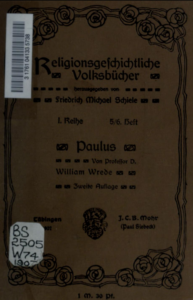 I found this little book of particular interest not because of the ideas themselves but because of who wrote them. William Wrede is best known for his study of the Gospel of Mark, The Messianic Secret. I was unaware until recently that he also wrote a book about Paul. It’s available on archive.org — http://archive.org/details/Paulpaulus The link is to the English language translation. (It’s not a long book: 180 somewhat small pages only a light population of words on each.)
I found this little book of particular interest not because of the ideas themselves but because of who wrote them. William Wrede is best known for his study of the Gospel of Mark, The Messianic Secret. I was unaware until recently that he also wrote a book about Paul. It’s available on archive.org — http://archive.org/details/Paulpaulus The link is to the English language translation. (It’s not a long book: 180 somewhat small pages only a light population of words on each.)
Wrede cannot accept that Paul himself arrived at all of his concepts and theology relating to Christ simply from meditating on what he knew of the historical Jesus. Even the ethics that Paul teaches derive from Judaism and not from Jesus, he explains. From the reports of the life of a man who existed only a few years earlier it is inconceivable, Wrede argues, that Paul could have arrived at his vision of the celestial pre-existence of the risen Jesus or so magnified the stories of the mortal man that he imagined him as a “superhuman Son of God”.
There remains only one explanation: Paul believed in such a celestial being, in a divine Christ, before he believed in Jesus. Until he became a Christian it seemed to him sacrilege to call Jesus the Christ. This man did not answer at all to the divine figure of Christ which Paul bore within him. But in the moment of conversion, when Jesus appeared before him in the shining glory of his risen existence, Paul identified him with his own Christ, and straightway transferred to Jesus all the conceptions which he already had of the celestial being—for instance, that he had existed before the world and had taken part in its creation. The man Jesus was really, therefore, only the wearer of all those mighty predicates which had already been established; but the bliss of the apostle lay in this, that he could now regard what had hitherto been a mere hope, as a tangible reality which had comeinto the world. Here again we see the great importance ofthe fact that he had not known Jesus. Intimate disciples could not so readily believe that the man with whom they had sat at table in Capernaum, or sailed on the Lake of Galilee, was the creator of the world. But in Paul’s way there was no such obstacle.
If Paul was acquainted with this divine Christ before his conversion, there must have beencircles in Judaism which held the same belief. But can such a belief in this field be really authenticated? So much is certain, that Jewish apocalyptic books are really cognizant of a Messiah, who before his appearance lives in heaven, and is more exalted than the angels themselves. This is a datum of the highest importance. Whether, however, every feature in the Pauline Christ can be explained by means of the extant apocalyptic accounts of Messiah, is a question we shall not here attempt to decide. Investigation is only now beginning to master the problem aright. The immediate point of supreme importance is the perception of this fact: that the Pauline Christ cannot be understood unless we assume that Paul, while still a Pharisee, possessed a number of definite conceptions concerning a divine being, which were afterwards transferred to the historical Jesus?
So how did it all happen in Wrede’s view?
First comes the idea of Christ. On this the whole conception of the redemption rests. For the death and resurrection of Christ are not regarded as the experiences of a man, but as the experiences of an incarnate divine being. It is upon this that their universal, world-redeemed significance depends. The key to the problem, in itself so enigmatical, why the Son of God became a man, was found by Paul in this twofold event. The idea of the redemption itself was again determined by the conceptions which the apostle brought with him. He expected his Christ to vanquish the evil powers of the world, including the demons, and to inaugurate a new condition of things. The accomplishmentof this task was found, where but in the two events of salvation? How Paul came to find it there must remain an open question. Probably these thoughts had long been definitely formulated in his mind before he was led by polemical exigencies to mint the doctrine of justification.
Not that Wrede was allowed the last word. As we would expect, others disagreed. For a two-part critical engagement with Wrede’s ideas see
Morgan, W. “The Jesus Paul Controversy 1.” The Expository Times 20, no. 1 (October 1908): 9–12. https://doi.org/10.1177/001452460802000102.
———. “The Jesus Paul Controversy 2.” The Expository Times 20, no. 2 (November 1908): 55–58. https://doi.org/10.1177/001452460802000202.
